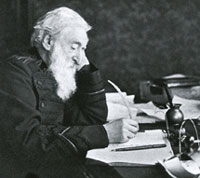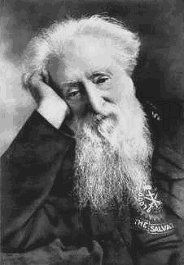General William Booth
Man of God!
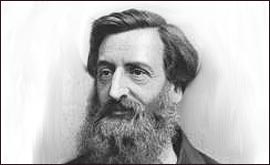
Note: There is no question that General William Booth did much good by founding the Salvation Army. However, I have a serious problem doctrinally with the official position of the Salvation Army on salvation. They teach...
We believe that continuance in a state of salvation depends upon continued obedient faith in Christ.
The implication is that salvation can be lost by not continuing in faith. I believe this teaching was more out of ignorance of the Bible than anything else. I believe that William Booth was a true believer and that those in the salvation Army are saved; but they adhere to the heresy that salvation can be lost. Salvation is a free gift from God, which cannot be lost. Those who claim to no longer be Christians were never saved in the first place. 1st John 2:19, "They went out from us, but they were not of us; for if they had been of us, they would no doubt have continued with us: but they went out, that they might be made manifest that they were not all of us." If saved, always saved.
Salvationist
'William Booth started out from Nottingham largely self-educated, penniless, and practically friendless. He had one fixed idea. The whole of his effort and talent would be directed to the one purpose - saving the world. Like his predecessor Wesley, he took the whole world as his parish. So well did he succeed, that before he died, his name was known in practically every country of that parish, and his followers numbered in millions. He began with nothing, had no money, no powerful friends, only his golden voice, his passion, and this vision of man reconciled to God.' -Nottingham Journal
To Save the World
The evangelist halted outside The Blind Beggar Tavern up the Mile End Road, East London. He was a tall figure in a frock coat and wide-brimmed hat and his piercing grey eyes looked out from a pale face. Drawing a book from beneath his arm, he gave out the verse of a hymn and faces pressed against the pub's glass windows. 'There is a heaven in East London for everyone,' he cried, 'for everyone who will stop and think and look to Christ as a personal Saviour.'
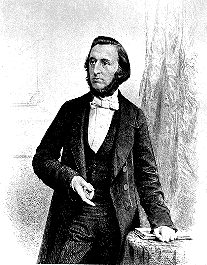 From
the pub came a volley of jeers and oaths, followed by a rotten egg. The preacher
paused, egg running down his cheek, prayed, and turned west towards Hammersmith
and his lodgings. He made his way through savage fighting men, ragged
match-sellers, orange-women, and Irish flower girls clad only in soiled
petticoats with their bare feet covered in dirt; children with wolfish faces
gobbling up decaying food left by the street market, or swaying blind drunk in
tap-room doorways. He strode past crowded tenements and stinking alleys where
life was a just a struggle; and the dark alleys near the docks where the sick
and dying lay side by side on bare boards of fireless rooms under tattered
scraps of blanket.
From
the pub came a volley of jeers and oaths, followed by a rotten egg. The preacher
paused, egg running down his cheek, prayed, and turned west towards Hammersmith
and his lodgings. He made his way through savage fighting men, ragged
match-sellers, orange-women, and Irish flower girls clad only in soiled
petticoats with their bare feet covered in dirt; children with wolfish faces
gobbling up decaying food left by the street market, or swaying blind drunk in
tap-room doorways. He strode past crowded tenements and stinking alleys where
life was a just a struggle; and the dark alleys near the docks where the sick
and dying lay side by side on bare boards of fireless rooms under tattered
scraps of blanket.
'A large muckheap what the rich grows their mushrooms on,' was how one pauper described East London. After thirteen years as a Methodist Circuit Minister, the preacher was no stranger to it. But as he walked home a conviction grew within him. Towards midnight when he arrived at his lodgings, he found his six children in bed. His wife, Catherine Booth, who worried over their precarious financial position, waited in the living room. Excitedly he burst out: 'Darling, I've found my destiny!' Convinced that the churches had failed the people, William Booth would set out to save the world. The year was 1865.
Sneinton
Son of a speculative builder, William Booth was born at 12 Notintone Place, a red-brick terrace house at Sneinton, Nottingham, in 1829. William was taken away from school at thirteen years of age and apprenticed to a pawnbroker when the Booth family plunged into poverty - a mortgage was called in.
These were hungry years when local stockingers were hard-hit by poor trading and the high price of bread caused riots. Under the three brass balls, the sight of desperate, hungry mothers pawning their weddings rings to feed their families became etched on William's memory.
Life for the Booth family didn't improve when his father died a year later and his mother and two sisters moved to a shop on Goosegate selling toys and tape, needles and cotton. At the age of fifteen William began to attend Wesley Chapel.
His conversion simply came at 11 o'clock one night in the streets of Nottingham while trudging home from a meeting. As he himself recorded, he saw with sudden clarity that he must renounce sin and atone to others for the wrongs he had done them. Kneeling at a bare table in the Broad Street Chapel, he vowed: 'God should have all there was of William Booth.'
Along with his friend, Will Sansom, son of a well-to-do lace manufacturer, he began to emulate his hero John Wesley who had preached in the open air to the downtrodden. His first sermon was outside the house that the pair rented in Kidd Street. Standing on a chair to sing and speak, he urged his listeners in where a room inside was the penitent room.
Noticing that the poorest and most degraded never came forward, William began to address open-air meetings in 'The Bottoms', Nottingham's cruelest slum that housed the outcasts of the Industrial Revolution.
One Sunday morning in 1846, William led his 'gang of slummers' - ragged and dirty converts from 'The Bottoms' - through the main entrance of the Wesley Chapel where they filed into the best seats for worship. They were soon banished to using the rear entrance and required to sit on obscure, backless, wooden benches behind the pulpit, out of sight of the congregation. Methodism had become respectable.
William had one astonishing conversion. 'Besom' Jack, a drunken broom-seller whose wife had been reduced to begging tea-leaves from neighbours, became one of his devoted followers.
London
With apprenticeship complete, almost friendless and penniless, equipped only with a bible, the nineteen-year-old William traveled to London. For a while he worked as a pawnbroker on weekdays and lay preached on a Sunday till a Methodist Reformer and boot maker, Edward Rabbits, heard him preach and liked it. After inviting him home to dinner, Rabbits offered him twenty shillings a week as an evangelist. Within months the Reformers offered him a circuit at Spalding.
At one of the meetings of the Reformers he met and fell in love with Catherine Mumford. Deeply attached to the Methodist cause, she had already read the Bible several times and despite her delicate health was no shrinking violet. She believed in the equality of the sexes and unfailingly bolstered William at his times of despair. 'Never mind. Do not give way. God loves you. He will sustain you,' she would say. To Catherine, William was a man of destiny.
After eighteen months in charge of the Spalding circuit for the Reformers, William began studying under Dr. Cooke at the Methodist Connexion. So impressed was Dr. Cooke by William's love of mankind that the youngster was soon appointed London Circuit Superintendent.
Traveling Evangelist
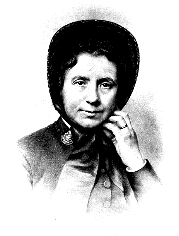 William
married Catherine (pictured right) in 1855, three years after their first
meeting. The couple had no settled home for he became the New Connexion's
traveling evangelist. Steaming up and down the country by train, they lived
precariously on £2 a week, rearing a young not altogether healthy family of
children that eventually totaled eight. Though an invalid herself, Catherine
found time to look after them, bake the bread, and help at meetings. Without
her, William later admitted, he could never have fulfilled his life's work.
William
married Catherine (pictured right) in 1855, three years after their first
meeting. The couple had no settled home for he became the New Connexion's
traveling evangelist. Steaming up and down the country by train, they lived
precariously on £2 a week, rearing a young not altogether healthy family of
children that eventually totaled eight. Though an invalid herself, Catherine
found time to look after them, bake the bread, and help at meetings. Without
her, William later admitted, he could never have fulfilled his life's work.
At his whirlwind revival meetings, William was averaging over twenty converts a day. In 1857 the Connexion cut short Booth's travels and put him in charge of their Brighouse circuit in Yorkshire where the Booths battled to improve the lot of seven-year-old mill girls working a fourteen-hour day.
Two years later the Booths were moved to Gateshead. To Catherine Booth, the Devil was a personal opponent and at the Bethseda's Chapel, she herself began to preach. Many leading Methodists shook their heads at this revolutionary step and wanted to curb these independent Booths. With his wife's support, William soon broke with Methodist New Connexion.
At thirty-two years of age with a wife and four children to support, William Booth had hopeless prospects. 'All Britain is now open to you,' a fellow evangelist told him but soon the chapels of the New Connexion barred their doors to him. Undaunted, he hired secular buildings, even a circus tent, to which the lost and degraded could come. The Booths carried no dogma. All they wanted to do was to stand up in the market place and sound off the glory of the Lord. Catholic, Protestant, Buddhist or Mohammedan, it didn't matter - these were lost creatures who were in need of comfort and hope.
The greatest preacher since Wesley, Booth was a little flamboyant, a little melodramatic, but he roused thousands to repentance and hope. 'Religion,' he said, 'means loving God with all your heart and your neighbour as yourself.'
Catherine was also much in demand as a preacher and in March 1865 she led revival services in the smoky dockland parishes of East London. It was then that William began preaching at the Mile End Waste where every fifth shop was a gin-shop. With a Bible under his arm, he exhorted those outside the taverns to convert and it was here that his destiny was made plain to him - saving those souls the churches didn't want to know.
In this same year, the hymn 'Onward Christian Soldiers' was written.
THE FOUNDER OF THE SALVATION ARMY
William Booth began The Salvation Army in July 1865. Preaching to a small street congregation in the slums of London, his spirit was as militant as that of a professional soldier while battling an almost overwhelming enemy.
Thieves, prostitutes, gamblers, and drunkards were among Booth's first converts to Christianity. His congregations were desperately poor. He preached hope and salvation. His aim was to lead them to Christ and link them to a church for continued spiritual guidance.
Even though Booth's followers were converted, churches did not accept them because of what they had been. However, Booth gave their lives direction in both a spiritual and practical manner and put them to work to save others who were like themselves. They, too, preached and sang in the streets as a living testimony to the power of God.
In 1867, Booth had only 10 full-time workers. By 1874, the numbers had grown to 1,000 volunteers and 42 evangelists. They served under the name "The Christian Mission" and Booth assumed the title of General Superintendent, although his followers called him "General." Known as the "Hallelujah Army," the converts spread out of the east end of London into neighboring areas and then to other cities.
In 1878, Booth was reading a printer's proof of the organization's annual report when he noticed the statement, "the Christian Mission under the [sic] Superintendent's of the Rev. William Booth is a volunteer army." He crossed out the words "volunteer army" and penned in "Salvation Army." From those words came the basis of the foundation deed of The Salvation Army which was adopted in August of that same year.
The Salvation Army gained a foothold in the United States by the work of Lieutenant Eliza Shirley, who had left England to join her parents. She held the first meeting of The Salvation Army in America in Philadelphia in 1879. In 1880, General Booth sent a party of eight Salvationists, led by George Scott Railton, to officially begin the work of The Salvation Army in the United States.
In 1886, President Grover Cleveland received a delegation of Salvation Army officers and gave the organization a warm personal endorsement. This was the first recognition from the White House and was followed by similar receptions from succeeding presidents of the United States. The Salvation Army expanded rapidly to Canada, Australia, France, Switzerland, India, South Africa, Iceland, Germany, and many other countries.
General Booth's death in 1912 was a great loss to The Salvation Army. However, he had laid a firm foundation for the organization. Today, The Salvation Army serves people in 103 countries.
Booth, William
Booth, William, 18291912, English religious leader, founder and first general of the Salvation Army, b. Nottingham. Originally a local preacher for the Wesleyan Methodists, he went (1849) to London and entered (1852) the ministry of the Methodist New Connexion Church, but in 1861 he began independent evangelistic work. In 1865, with the help of his wife, Catherine Booth, he started the East London Revival Society (soon known as the Christian Mission) in Whitechapel, London. The Christian Mission developed in 1878 into the Salvation Army. General Booth, a remarkable organizer, traveled widely, winning recognition wherever he went. In 1890 he published In Darkest England and the Way Out in collaboration with W. T. Stead. See Booth, family; Booth, Evangeline Cory.
See biographies by G. S. Railton (2d ed. 1912), H. Begbie (1920), St. J. Ervine (2 vol., 1934), H. C. Steele (1954), E. Bishop (1964), and R. Collier (1965); R. Hattersley, Blood and Fire (2000).
The Columbia Electronic Encyclopedia, 6th ed. Copyright © 2005, Columbia University Press. All rights reserved.
William Booth - "Try Tears"
On April 9,1865, Lee met Grant in the parlor of a private home at Appomattox Court House. He surrendered his army and brought an end to four long years of death and devastation called the Civil War. In the same year a 36 year old Englishman by the name of William Booth declared war on the powers of darkness by founding the Salvation Army.
One of the most effective weapons in General
Booth's arsenal was fervent prayer. It was not unusual for Booth to hold "an
all night of prayer" when he came to preach the Word of God. People would
flood the altars every where he went. "The power of God was wonderfully
manifest in the meetings . . . people were frequently, struck down,
overwhelmed with a sense of
the presence and power of God."
 The Salvation
Army's success at freeing the captives was uncanny, especially when one
considers those who it strived to reach. General Booth's battle cry was "Go
for souls and go for the worst." The worst of sinners were saved, saloons were
closed and entire cities were shaken.
The Salvation
Army's success at freeing the captives was uncanny, especially when one
considers those who it strived to reach. General Booth's battle cry was "Go
for souls and go for the worst." The worst of sinners were saved, saloons were
closed and entire cities were shaken.
Booth's success attracted not only supporters but also enemies. Those who served in the Army were pelted with hot coals, sprayed with tar and burning sulfur, beat, stoned and even kicked to death in the streets. The Salvation Army resisted their enemies with a cheerful "God bless you", and a prayer. General Booth, himself was often in the thick of it. When spit on during the Midlands tour, Booth encouraged his fellow soldiers, "Don't rub it off - it's a medal!"
Night after night Booth would come home bleeding
and bruised after being attacked for preaching in the slums of England. After
such nights of testing he would take his wife's hand and say, "Kate, let me
pray with you." After praying with Catherine he would rise from his knees
armed with fresh courage and hope. Booth needed all the valor his wife
Catherine could inspire
in him. She encouraged him, "if we get tired we had better go and be done
with, anything is better than a dead church." Despite the grinding pressures
of the ministry the Booths had a happily united family. The General had nine
children and loved to play and romp with them, especially in their favorite
game of "Fox and Geese."
Once while traveling, General Booth's car was detained. He took advantage of the opportunity and exhorted some idle factory workers. He said, "some of you men never pray, you gave up praying long ago. But I'm going to say to you, won't you pray for your children that they may be different?" Within minutes 700 men knelt in silent prayer.
At another time, two Salvation Army officers set out to found a new work, only to meet with failure and opposition. Frustrated and tired they appealed to the General to close the rescue mission. General Booth sent back a telegram with two words on it, "TRY TEARS." They followed his advice and they witnessed a mighty revival.
During the course of William Booths ministry he traveled 5,000,000 miles and preached 60,000 sermons. God help us in this desperate and distracted day in which we live to heed the General's advice. "Work as if everything depended upon your work, and pray as if everything depended upon your prayer."
References Used:
"The General Next To God" by Richard Collier
"Deeper Experiences of Famous Christians" by James G. Lawson
"The Life of General William Booth" by H. Begbie
Chronological History
| 1829 - William Booth was born at 12 Notintone Place in Sneinton, Nottingham. | |
| 1842 - Taken out of school at 13 years old, to become an apprentice pawn broker. His family had been plunged into poverty. | |
| 1843 - Father dies. | |
| 1845 - Starts to attend Wesley Chapel. During this time he believed that he must renounce sin and atone to others for the wrongs he had done to them. William begins to address open air meetings. | |
| 1846 - Leads converts from the slums into the Wesley Chapel, they're quickly moved to the back of the hall. William becomes the New Connexion's travelling evangelist. | |
| 1855 - Marries Catherine. | |
| 1857 - William begins gathering 20 converts a day, Connexion cut short Booth's travels and put him in charge of their Brighouse circuit in Yorkshire. | |
| 1859 - William and Catherine break with Methodist New Connexion. William goes alone, and becomes a respected preacher. | |
| 1865 - William begins preaching around London's Mile End, trying to save souls that the church didn't want to know. | |
| 1875 - After his first sermons at Mile End, William has 26 stations. Around this time they were known as the Volunteer army. | |
| 1878 - Their name is changed to the Salvation Army. Various achievements are made, including groundbreaking work with the poor and a labour exchange. | |
| 1890 - Catherine Booth dies. | |
| 1890 onwards - Booth becomes a wildly respected international figure fighting poverty. | |
| 1912 - On 21st August, William Booth dies aged 83. 150,000 mourners attend his funeral. |
"The greatness of a man's power is the measure of his surrender." -General William Booth
